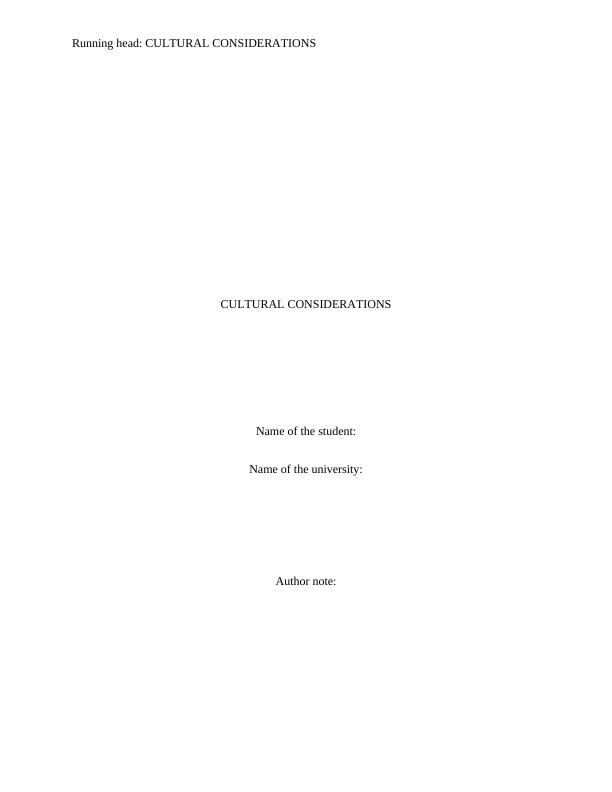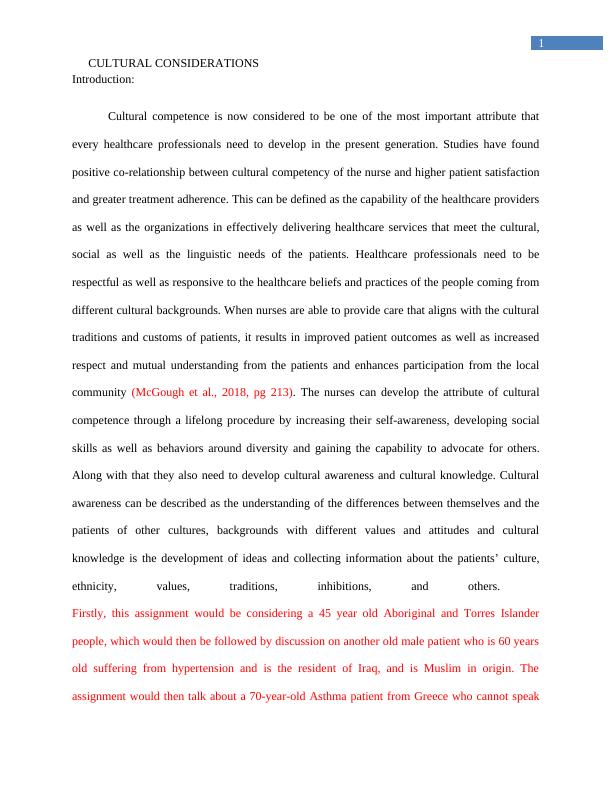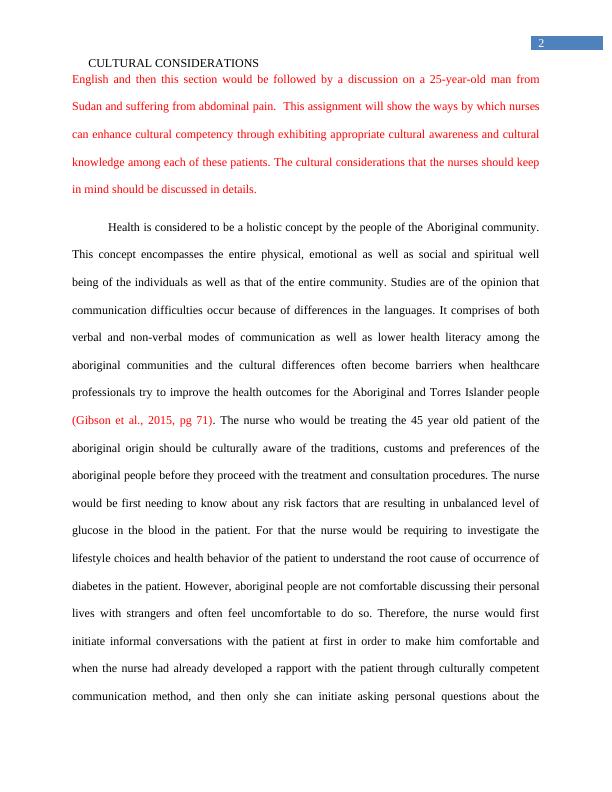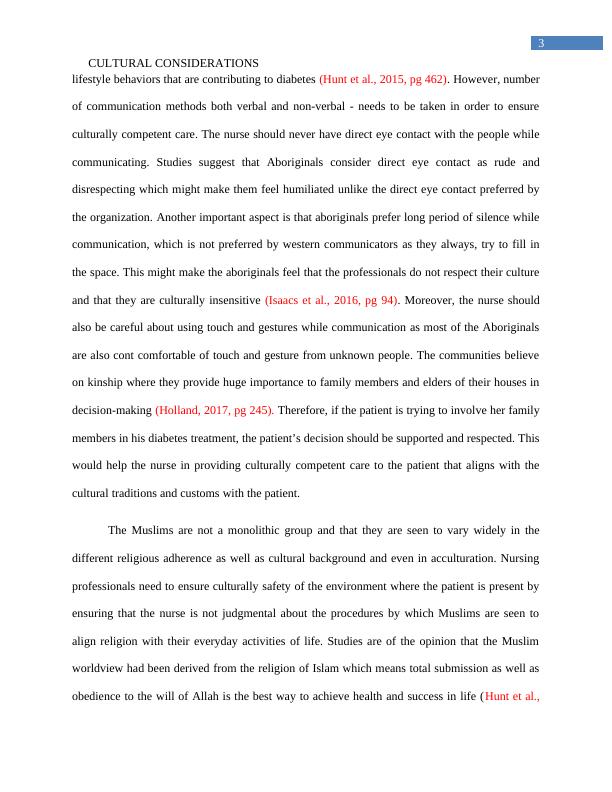Cultural Considerations in Healthcare
Added on 2023-01-16
11 Pages3565 Words42 Views
Running head: CULTURAL CONSIDERATIONS
CULTURAL CONSIDERATIONS
Name of the student:
Name of the university:
Author note:
CULTURAL CONSIDERATIONS
Name of the student:
Name of the university:
Author note:

1
CULTURAL CONSIDERATIONS
Introduction:
Cultural competence is now considered to be one of the most important attribute that
every healthcare professionals need to develop in the present generation. Studies have found
positive co-relationship between cultural competency of the nurse and higher patient satisfaction
and greater treatment adherence. This can be defined as the capability of the healthcare providers
as well as the organizations in effectively delivering healthcare services that meet the cultural,
social as well as the linguistic needs of the patients. Healthcare professionals need to be
respectful as well as responsive to the healthcare beliefs and practices of the people coming from
different cultural backgrounds. When nurses are able to provide care that aligns with the cultural
traditions and customs of patients, it results in improved patient outcomes as well as increased
respect and mutual understanding from the patients and enhances participation from the local
community (McGough et al., 2018, pg 213). The nurses can develop the attribute of cultural
competence through a lifelong procedure by increasing their self-awareness, developing social
skills as well as behaviors around diversity and gaining the capability to advocate for others.
Along with that they also need to develop cultural awareness and cultural knowledge. Cultural
awareness can be described as the understanding of the differences between themselves and the
patients of other cultures, backgrounds with different values and attitudes and cultural
knowledge is the development of ideas and collecting information about the patients’ culture,
ethnicity, values, traditions, inhibitions, and others.
Firstly, this assignment would be considering a 45 year old Aboriginal and Torres Islander
people, which would then be followed by discussion on another old male patient who is 60 years
old suffering from hypertension and is the resident of Iraq, and is Muslim in origin. The
assignment would then talk about a 70-year-old Asthma patient from Greece who cannot speak
CULTURAL CONSIDERATIONS
Introduction:
Cultural competence is now considered to be one of the most important attribute that
every healthcare professionals need to develop in the present generation. Studies have found
positive co-relationship between cultural competency of the nurse and higher patient satisfaction
and greater treatment adherence. This can be defined as the capability of the healthcare providers
as well as the organizations in effectively delivering healthcare services that meet the cultural,
social as well as the linguistic needs of the patients. Healthcare professionals need to be
respectful as well as responsive to the healthcare beliefs and practices of the people coming from
different cultural backgrounds. When nurses are able to provide care that aligns with the cultural
traditions and customs of patients, it results in improved patient outcomes as well as increased
respect and mutual understanding from the patients and enhances participation from the local
community (McGough et al., 2018, pg 213). The nurses can develop the attribute of cultural
competence through a lifelong procedure by increasing their self-awareness, developing social
skills as well as behaviors around diversity and gaining the capability to advocate for others.
Along with that they also need to develop cultural awareness and cultural knowledge. Cultural
awareness can be described as the understanding of the differences between themselves and the
patients of other cultures, backgrounds with different values and attitudes and cultural
knowledge is the development of ideas and collecting information about the patients’ culture,
ethnicity, values, traditions, inhibitions, and others.
Firstly, this assignment would be considering a 45 year old Aboriginal and Torres Islander
people, which would then be followed by discussion on another old male patient who is 60 years
old suffering from hypertension and is the resident of Iraq, and is Muslim in origin. The
assignment would then talk about a 70-year-old Asthma patient from Greece who cannot speak

2
CULTURAL CONSIDERATIONS
English and then this section would be followed by a discussion on a 25-year-old man from
Sudan and suffering from abdominal pain. This assignment will show the ways by which nurses
can enhance cultural competency through exhibiting appropriate cultural awareness and cultural
knowledge among each of these patients. The cultural considerations that the nurses should keep
in mind should be discussed in details.
Health is considered to be a holistic concept by the people of the Aboriginal community.
This concept encompasses the entire physical, emotional as well as social and spiritual well
being of the individuals as well as that of the entire community. Studies are of the opinion that
communication difficulties occur because of differences in the languages. It comprises of both
verbal and non-verbal modes of communication as well as lower health literacy among the
aboriginal communities and the cultural differences often become barriers when healthcare
professionals try to improve the health outcomes for the Aboriginal and Torres Islander people
(Gibson et al., 2015, pg 71). The nurse who would be treating the 45 year old patient of the
aboriginal origin should be culturally aware of the traditions, customs and preferences of the
aboriginal people before they proceed with the treatment and consultation procedures. The nurse
would be first needing to know about any risk factors that are resulting in unbalanced level of
glucose in the blood in the patient. For that the nurse would be requiring to investigate the
lifestyle choices and health behavior of the patient to understand the root cause of occurrence of
diabetes in the patient. However, aboriginal people are not comfortable discussing their personal
lives with strangers and often feel uncomfortable to do so. Therefore, the nurse would first
initiate informal conversations with the patient at first in order to make him comfortable and
when the nurse had already developed a rapport with the patient through culturally competent
communication method, and then only she can initiate asking personal questions about the
CULTURAL CONSIDERATIONS
English and then this section would be followed by a discussion on a 25-year-old man from
Sudan and suffering from abdominal pain. This assignment will show the ways by which nurses
can enhance cultural competency through exhibiting appropriate cultural awareness and cultural
knowledge among each of these patients. The cultural considerations that the nurses should keep
in mind should be discussed in details.
Health is considered to be a holistic concept by the people of the Aboriginal community.
This concept encompasses the entire physical, emotional as well as social and spiritual well
being of the individuals as well as that of the entire community. Studies are of the opinion that
communication difficulties occur because of differences in the languages. It comprises of both
verbal and non-verbal modes of communication as well as lower health literacy among the
aboriginal communities and the cultural differences often become barriers when healthcare
professionals try to improve the health outcomes for the Aboriginal and Torres Islander people
(Gibson et al., 2015, pg 71). The nurse who would be treating the 45 year old patient of the
aboriginal origin should be culturally aware of the traditions, customs and preferences of the
aboriginal people before they proceed with the treatment and consultation procedures. The nurse
would be first needing to know about any risk factors that are resulting in unbalanced level of
glucose in the blood in the patient. For that the nurse would be requiring to investigate the
lifestyle choices and health behavior of the patient to understand the root cause of occurrence of
diabetes in the patient. However, aboriginal people are not comfortable discussing their personal
lives with strangers and often feel uncomfortable to do so. Therefore, the nurse would first
initiate informal conversations with the patient at first in order to make him comfortable and
when the nurse had already developed a rapport with the patient through culturally competent
communication method, and then only she can initiate asking personal questions about the

3
CULTURAL CONSIDERATIONS
lifestyle behaviors that are contributing to diabetes (Hunt et al., 2015, pg 462). However, number
of communication methods both verbal and non-verbal - needs to be taken in order to ensure
culturally competent care. The nurse should never have direct eye contact with the people while
communicating. Studies suggest that Aboriginals consider direct eye contact as rude and
disrespecting which might make them feel humiliated unlike the direct eye contact preferred by
the organization. Another important aspect is that aboriginals prefer long period of silence while
communication, which is not preferred by western communicators as they always, try to fill in
the space. This might make the aboriginals feel that the professionals do not respect their culture
and that they are culturally insensitive (Isaacs et al., 2016, pg 94). Moreover, the nurse should
also be careful about using touch and gestures while communication as most of the Aboriginals
are also cont comfortable of touch and gesture from unknown people. The communities believe
on kinship where they provide huge importance to family members and elders of their houses in
decision-making (Holland, 2017, pg 245). Therefore, if the patient is trying to involve her family
members in his diabetes treatment, the patient’s decision should be supported and respected. This
would help the nurse in providing culturally competent care to the patient that aligns with the
cultural traditions and customs with the patient.
The Muslims are not a monolithic group and that they are seen to vary widely in the
different religious adherence as well as cultural background and even in acculturation. Nursing
professionals need to ensure culturally safety of the environment where the patient is present by
ensuring that the nurse is not judgmental about the procedures by which Muslims are seen to
align religion with their everyday activities of life. Studies are of the opinion that the Muslim
worldview had been derived from the religion of Islam which means total submission as well as
obedience to the will of Allah is the best way to achieve health and success in life (Hunt et al.,
CULTURAL CONSIDERATIONS
lifestyle behaviors that are contributing to diabetes (Hunt et al., 2015, pg 462). However, number
of communication methods both verbal and non-verbal - needs to be taken in order to ensure
culturally competent care. The nurse should never have direct eye contact with the people while
communicating. Studies suggest that Aboriginals consider direct eye contact as rude and
disrespecting which might make them feel humiliated unlike the direct eye contact preferred by
the organization. Another important aspect is that aboriginals prefer long period of silence while
communication, which is not preferred by western communicators as they always, try to fill in
the space. This might make the aboriginals feel that the professionals do not respect their culture
and that they are culturally insensitive (Isaacs et al., 2016, pg 94). Moreover, the nurse should
also be careful about using touch and gestures while communication as most of the Aboriginals
are also cont comfortable of touch and gesture from unknown people. The communities believe
on kinship where they provide huge importance to family members and elders of their houses in
decision-making (Holland, 2017, pg 245). Therefore, if the patient is trying to involve her family
members in his diabetes treatment, the patient’s decision should be supported and respected. This
would help the nurse in providing culturally competent care to the patient that aligns with the
cultural traditions and customs with the patient.
The Muslims are not a monolithic group and that they are seen to vary widely in the
different religious adherence as well as cultural background and even in acculturation. Nursing
professionals need to ensure culturally safety of the environment where the patient is present by
ensuring that the nurse is not judgmental about the procedures by which Muslims are seen to
align religion with their everyday activities of life. Studies are of the opinion that the Muslim
worldview had been derived from the religion of Islam which means total submission as well as
obedience to the will of Allah is the best way to achieve health and success in life (Hunt et al.,

End of preview
Want to access all the pages? Upload your documents or become a member.
Related Documents
Developing Cultural Competence for Providing Therapeutic Relationship with Aboriginal Patientslg...
|8
|2346
|324
Improving Cultural Safety for Aboriginal and Torres Strait Islanders in Healthcare Facilitylg...
|6
|1400
|372
Rising to the Challenge: Cultural Safety in Nursinglg...
|4
|740
|49
Reflection on How the Indigenous Health and Well-Being Will Impact on My Future Nursing Practicelg...
|4
|803
|16
Treating Scabies in Indigenous Paediatric Patientslg...
|1
|1590
|18
Cultural Competence in Nursinglg...
|11
|2933
|184
